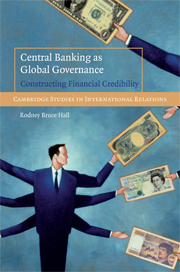Book contents
- Frontmatter
- Contents
- Preface
- 1 Central banking as governance
- 2 The social character of money
- 3 Instituting facts and constituting rules
- 4 Constitutive power relations
- 5 Rules and international monetary systems
- 6 Central bank independence as credibility
- 7 Transparency and intersubjectivity in central banking
- Bibliography
- Index
- Cambridge Studies in International Relations
- References
1 - Central banking as governance
Published online by Cambridge University Press: 03 May 2010
- Frontmatter
- Contents
- Preface
- 1 Central banking as governance
- 2 The social character of money
- 3 Instituting facts and constituting rules
- 4 Constitutive power relations
- 5 Rules and international monetary systems
- 6 Central bank independence as credibility
- 7 Transparency and intersubjectivity in central banking
- Bibliography
- Index
- Cambridge Studies in International Relations
- References
Summary
Don't fight the Fed!
Wall Street aphorismIt is well enough that the people of the nation do not understand our banking and monetary system for, if they did, I believe there would be a revolution before tomorrow morning.
Henry Ford Sr.Governance is thus a system of rule that is as dependent on intersubjective meanings as on formally sanctioned constitutions and charters.
James N. RosenauThe literature on central banking is currently dominated by references to the need for, or attempts by central banks to attain, “credibility” with the financial markets. The vehicles by which central banks are to attain this credibility are typically identified by monetary economists and central bankers as “independence” and “transparency.” Independent central banks have the authority to conduct monetary policy without interference or political pressure from the finance ministry or the government. This independence can be granted as full “operational independence” where the choice of the vehicles by which monetary policy is executed is left to the discretion of the central bank. It can also be granted in the form of “goal independence” where the level of domestic inflation to be tolerated as consistent with the mandate of the central bank to maintain “price stability” is also left to the discretion of the central bank.
Possession of either or both of these forms of independence leaves the central bank in command of enormous authority over, for example, the domestic money supply and the supply and price of short-term credit to the banking sector, as well as the price of money in the short-term money markets.
- Type
- Chapter
- Information
- Central Banking as Global GovernanceConstructing Financial Credibility, pp. 1 - 13Publisher: Cambridge University PressPrint publication year: 2008



